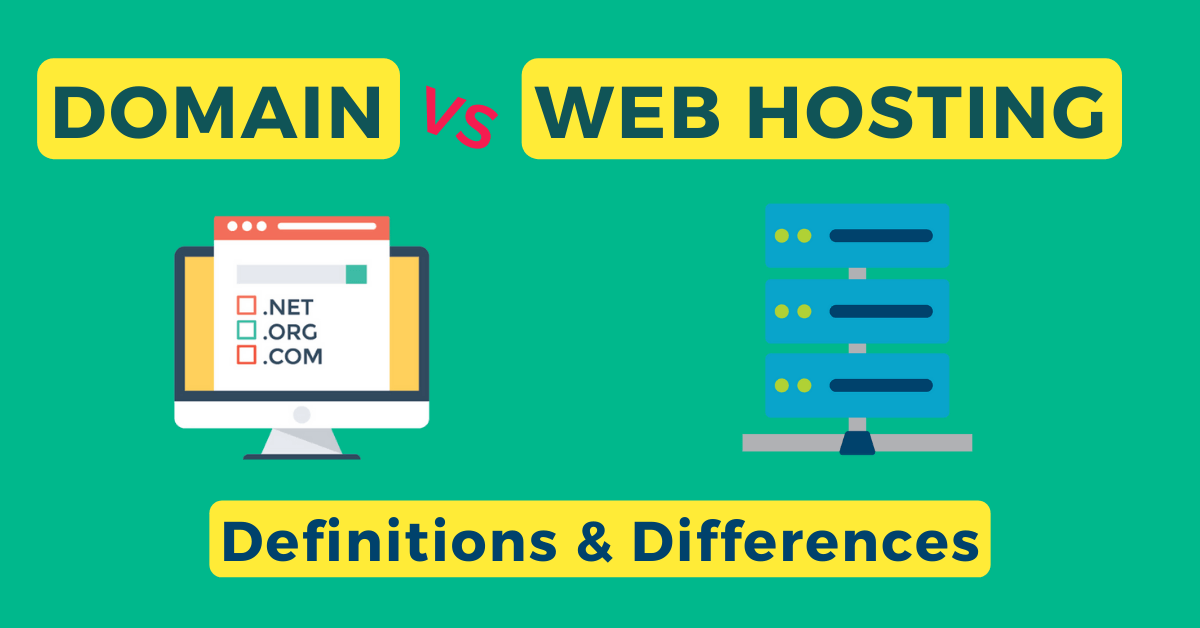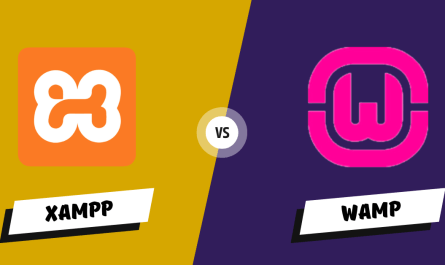Introduction
In the vast expanse of the internet, there are two fundamental components that power every website: domain names and web hosting. These two elements often need clarification and clarification with each other, leading to some perplexing moments for beginners. So, let’s embark on a journey to demystify the world of domains and web hosting in a friendly and conversational tone.
Understanding the Basics
Before we dive deep into the realm of domain vs web hosting, it’s essential to understand the basics.
What is a Domain Name?
Imagine the internet as a massive city with countless houses and buildings. Each home has a unique address that allows people to find it. Similarly, a domain name is like the address for a website on the internet. It’s the user-friendly name we type into our browsers to visit a website, like “www.example.com.”
A domain name consists of two parts: the domain itself (e.g., “example”) and the top-level domain (TLD) (e.g., “.com,” “.org,” “.net”). The combination of these two parts forms a unique identifier for your website.
What is Web Hosting?
Now, think of web hosting as the physical space where you build and store your website. In our city analogy, web hosting is the land or building on which a house is constructed. The service provides the storage, server space, and technology necessary to keep your website running 24/7.
Web hosting comes in various forms, from shared hosting (like apartment living) to dedicated servers (like owning a private house). Depending on your website’s needs, you can select the type of web hosting that suits you best.
The Relationship Between Domain Names and Web Hosting
Many people mistakenly think that domain names and web hosting are the same, but they serve distinct purposes. However, they are closely interlinked and work together to make a website accessible on the internet.
How Do They Interact?
Let’s return to our city analogy. Your domain name is like the street address, telling people where to find your website. Your web hosting is like the actual building where your website resides. To make your website accessible, you must set up your domain name for your web hosting.
This connection is established through Domain Name System (DNS) settings. When someone types your domain name in their browser, the DNS settings point them to the web server where your website’s files are stored. The web server retrieves those files and displays your website to the visitor.
The Independence of Domain Names and Web Hosting
While they work together seamlessly, it’s essential to understand that domain names and web hosting can be obtained separately. You can register a domain name without purchasing web hosting and vice versa.
For example, you might secure a domain name for future use even if you don’t have a website ready. Or, you could purchase web hosting without immediately deciding on a domain name, allowing you to build and test your website privately before making it publicly accessible.
Choosing the Perfect Domain Name
Now that we’ve unravelled the distinction between domain names and web hosting, let’s focus on selecting the perfect domain name for your website.
Brainstorming Your Domain Name
Choosing a domain name can be a challenging task, but it’s fun. It’s like naming your business or your first-born child; it’s something you want to get right.
Here are some tips to get your creative juices flowing:
- Keep it Short and Sweet: Short domain names are more accessible to type and remember. Aim for brevity without compromising on relevance.
- Include Keywords: Incorporate keywords related to your website’s content. This can boost your site’s search engine visibility.
- Avoid Hyphens and Numbers: These can make your domain name harder to remember and type.
- Check for Trademarks: Ensure your domain name doesn’t infringe on any existing trademarks.
- Think Long-term: Consider how your domain name might fit your brand. It’s a long-term commitment.
Domain Name Extensions
The TLD, or domain extension, is the part of your domain name that follows the dot (e.g., “.com,” “.org,” “.net”). Here’s a brief rundown of some common TLDs and their uses:
- .com: The most popular and widely recognized TLD, suitable for most websites.
- .org: Often used by non-profit organizations.
- .net: Originally intended for network-related websites, but now used for various purposes.
- .co: A popular alternative to .com when your desired domain is already taken.
- .io: Frequently used for tech and startup websites.
- .blog: Perfect for bloggers and content-driven websites.
- .store: Ideal for e-commerce and online stores.
- .edu: Reserved for educational institutions.
- .gov: Restricted for government websites.
When choosing a TLD, consider the nature of your website and your target audience. While .com is the go-to choice for most, there are plenty of other TLDs to suit different purposes.
Web Hosting Options
With your domain name sorted, it’s time to explore the various web hosting options. Think of this as choosing the kind of land or building where your website will reside in our city analogy.
Shared Hosting
Shared hosting is akin to leasing a unit in a multi-level apartment complex. In this scenario, many websites share the same server resources, including CPU, RAM, and storage. It’s a cost-effective option suitable for small websites and beginners.
Pros:
- Cost-effective.
- The hosting provider manages it, so minimal technical knowledge is required.
- Ideal for personal blogs, small business websites, and startups.
Cons:
- Limited resources are shared among multiple websites.
- Performance may be impacted when other websites sharing the same server encounter substantial traffic increases.
VPS Hosting (Virtual Private Server)
VPS hosting is akin to owning a condo in a high-rise building. You have your dedicated space on a shared server, which gives you more control and resources compared to shared hosting.
Pros:
- More control over server resources.
- Better performance than shared hosting.
- Scalable, allowing you to upgrade as your website grows.
Cons:
- Requires some technical knowledge to manage.
- Costs more than shared hosting.
Dedicated Hosting
Dedicated hosting is equivalent to owning a private house in our city. In this scenario, you have an entire server all to yourself. It’s the most powerful and customizable hosting option.
Pros:
- Maximum control and resources.
- Exceptional performance and security.
- Suitable for large businesses and high-traffic websites.
Cons:
- High cost.
- Requires advanced technical skills for server management.
Cloud Hosting
Cloud hosting is like renting a flexible workspace in our ever-evolving city. Instead of relying on a single physical server, cloud hosting uses a network of virtual servers in multiple data centres. It offers scalability, reliability, and redundancy.
Pros:
- Scalable and can handle traffic spikes.
- Reliable with high uptime.
- Pay-as-you-go pricing, making it cost-effective for various businesses.
Cons:
- Pricing can be unpredictable if traffic surges unexpectedly.
- Requires some technical knowledge for configuration.
Managed WordPress Hosting
If WordPress powers your website, consider managed WordPress hosting. It’s like having a property management service for your website. Your hosting provider handles technical aspects, including security, updates, and backups.
Pros:
- Optimized for WordPress, ensuring fast performance.
- Automated updates and security management.
- Ideal for bloggers and small to medium-sized WordPress sites.
Cons:
- Less flexibility compared to other hosting options.
- Typically, it is more expensive than shared hosting.
Making the Right Choices
Now that you understand the differences between domain names and web hosting, as well as the various hosting options available, it’s time to make the right choices for your website.
Choosing the Perfect Domain Name
When selecting a domain name, keep the following points in mind:
- Relevance: Ensure your domain name reflects your website’s content or purpose.
- Memorability: Opt for a name that’s easy to remember and type.
- Avoid Copyright Issues: Research to ensure your domain name doesn’t infringe on trademarks.
- Think About Your Audience: Consider your target audience and what will resonate with them.
- Future-Proofing: Choose a name that will stand the test of time and accommodate potential growth or changes in your website’s focus.
Selecting the Right Hosting Plan
Your choice of hosting plan should align with your website’s needs and your technical expertise. Consider the following:
- Budget: Determine how much you’re willing to invest in hosting. Shared hosting is the most budget-friendly, while dedicated hosting is the most expensive.
- Technical Proficiency: Assess your technical skills. If you’re a beginner, shared or managed hosting might be more suitable. If you’re experienced, VPS or dedicated hosting could be a better fit.
- Website Traffic: Estimate your expected website traffic. If you anticipate rapid growth, consider scalable options like cloud hosting.
- Website Type: Different hosting types are more appropriate for specific website types. For instance, e-commerce websites benefit from the reliability and scalability of cloud hosting.
Registering Your Domain Name
Once you’ve settled on the perfect domain name, it’s time to register it. Here’s a step-by-step guide on how to do it:
Choose a Domain Name Registrar
A domain registration is a company that allows you to register and manage domain names. Popular domain registrars include GoDaddy, Namecheap, and Google Domains. Select one that suits your needs and budget.
Check Domain Name Availability
Use the registrar’s search tool to check if your desired domain name is available. If it’s not, you may need to get creative by trying different TLDs or variations of the word.
Register Your Domain
Once you find an available domain name, it’s time to register it. Select the domain name and TLD you want, and follow the registrar’s registration process. Be prepared to provide your contact information, which will be associated with the domain.
Domain Privacy Protection (Optional)
Domain privacy protection, or WHOIS privacy, conceals your personal contact information from the public WHOIS database. It’s an optional service, but it can help protect your privacy and reduce spam.
Setting Up Your Web Hosting
With your domain name registered, it’s time to set up your web hosting. This involves preparing the server or space where your website will reside.
Choose a Hosting Provider
Select a hosting provider based on your chosen hosting plan. Popular hosting providers include Bluehost, SiteGround, HostGator, and AWS (Amazon Web Services).
Purchase Your Hosting Plan
Once you’ve chosen a provider, select the hosting plan that aligns with your website’s needs and budget. Follow the provider’s purchasing process, which usually involves creating an account and entering your payment details.
Set Up DNS
After purchasing your hosting plan, you’ll receive DNS (Domain Name System) information from your hosting provider. This information includes the nameservers you need to update in your domain registrar’s settings to connect your domain to your hosting.
Install Website Software (If Necessary)
Depending on your website, you may need to install website-building software, such as WordPress, Joomla, or Drupal. Most hosting providers offer one-click installations for popular platforms.
Upload Website Files
If you’ve already built your website, you can upload your existing website files to your hosting server using an FTP (File Transfer Protocol) client. Make sure your website’s files are organized in the appropriate directory.
Maintaining Your Domain and Hosting
Registering a domain name and setting up web hosting is the beginning of your online journey. To ensure your website operates smoothly, you must maintain your domain and hosting.
Domain Renewal
Domain names typically need to be renewed yearly. Set a reminder to renew your domain name before it expires to prevent it from being released into the public pool.
Website Backups
Regularly back up your website’s files and databases. Many hosting providers offer automated backup solutions, but it’s wise to maintain your backups independently.
Security
Keep your website and hosting account secure by regularly updating software and plugins, using strong passwords, and employing security tools like firewalls and SSL certificates.
Monitoring and Optimization
Regularly monitor your website’s performance using tools like Google Analytics. Finetune your website for speed, mobile responsiveness, and search engine visibility.
Troubleshooting Common Issues
Even with the best preparations, you may need help with your domain and hosting. Let’s explore some common problems and how to troubleshoot them.
Domain Not Resolving to Website
If your domain isn’t pointing to your website, double-check the DNS settings. Ensure you’ve correctly updated the nameservers to those provided by your hosting provider.
Website Slow or Unavailable
Website performance issues can occur due to server load, unoptimized code, or a traffic surge. To address this, consider upgrading your hosting plan, optimizing your website, and implementing caching solutions.
Domain Expiry
If you forget to renew your domain, it can expire and be released back into the pool of available parts. To prevent this, set up auto-renewal or manually renew your domain before the expiration date.
Security Breaches
Security breaches can happen, leading to data loss or website defacement. Regularly update your website software, use strong passwords, and consider security plugins and monitoring tools.
Conclusion : Domain vs Web Hosting
In the grand scheme of the World Wide Web, domain names and web hosting are the dynamic duo that underpins your online presence. They’re the Batman and Robin of the digital realm, each playing a unique and essential role. While the domain name is your digital address, the web hosting provides the space and infrastructure to build your online empire.
Understanding the difference between these two elements, their relationship, and how to choose the right ones for your needs is crucial for anyone looking to embark on a digital adventure. With this knowledge, you’re well-prepared to navigate the ever-expanding digital universe and carve out your space in this boundless realm.
So, whether you’re starting a personal blog, launching a small business, or aspiring to conquer the e-commerce world, remember the importance of your domain name and web hosting. They’re your trusty companions on the journey through the digital wilderness, guiding you to success one click at a time.





I like the efforts you have put in this, regards for all the great content.
Thank you
I appreciate you sharing this blog post. Thanks Again. Cool.
I really like reading through a post that can make men and women think. Also, thank you for allowing me to comment!
There is definately a lot to find out about this subject. I like all the points you made
Thank you ♥
I like the efforts you have put in this, regards for all the great content.
Thank you
Great information shared.. really enjoyed reading this post thank you author for sharing this post .. appreciated